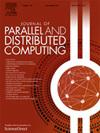Exploring data science workflows: A practice-oriented approach to teaching processing of massive datasets
IF 3.4
3区 计算机科学
Q1 COMPUTER SCIENCE, THEORY & METHODS
引用次数: 0
Abstract
Massive datasets are typically processed by a sequence of different stages, comprising data acquisition and preparation, data processing, data analysis, result validation, and visualization. In conjunction, these stages form a data science workflow, a key element enabling the solution of data-intensive problems. The complexity and heterogeneity of these stages require a diverse set of techniques and skills. This article discusses a hands-on practice-oriented approach aiming to enable and motivate graduate students to engage with realistic data science workflows. A major goal of the approach is to bridge the gap between academia and industry by integrating programming assignments that implement different data workflows with real-world data. In consecutive assignments, students are exposed to the methodology of solving problems using big data frameworks and are required to implement different data workflows of varying complexity. This practice-oriented approach is well received by students, as confirmed by different surveys.
探索数据科学工作流:面向实践的海量数据集处理教学方法
海量数据集通常由一系列不同的阶段处理,包括数据采集和准备、数据处理、数据分析、结果验证和可视化。结合起来,这些阶段形成了数据科学工作流,这是解决数据密集型问题的关键要素。这些阶段的复杂性和异质性需要不同的技术和技能。本文讨论了一种面向实践的方法,旨在使和激励研究生参与现实的数据科学工作流程。该方法的一个主要目标是通过将实现不同数据工作流的编程作业与实际数据集成在一起,弥合学术界和工业界之间的差距。在连续的作业中,学生将接触到使用大数据框架解决问题的方法,并需要实现不同复杂性的不同数据工作流程。不同的调查证实,这种以实践为导向的方法深受学生的欢迎。
本文章由计算机程序翻译,如有差异,请以英文原文为准。
求助全文
约1分钟内获得全文
求助全文
来源期刊

Journal of Parallel and Distributed Computing
工程技术-计算机:理论方法
CiteScore
10.30
自引率
2.60%
发文量
172
审稿时长
12 months
期刊介绍:
This international journal is directed to researchers, engineers, educators, managers, programmers, and users of computers who have particular interests in parallel processing and/or distributed computing.
The Journal of Parallel and Distributed Computing publishes original research papers and timely review articles on the theory, design, evaluation, and use of parallel and/or distributed computing systems. The journal also features special issues on these topics; again covering the full range from the design to the use of our targeted systems.
 求助内容:
求助内容: 应助结果提醒方式:
应助结果提醒方式:


